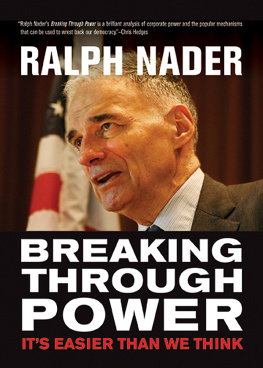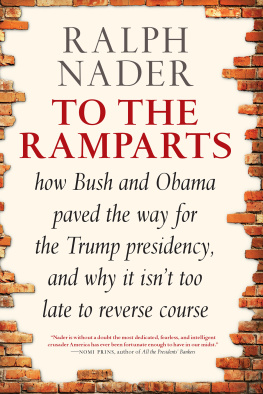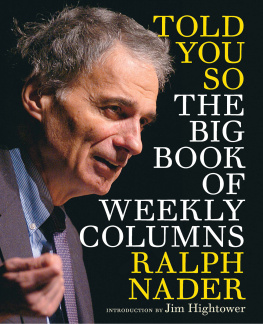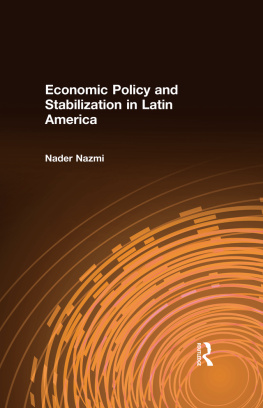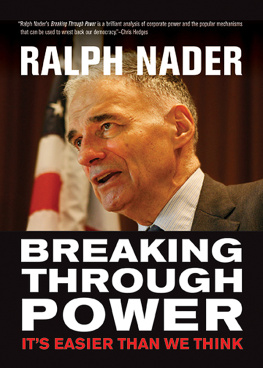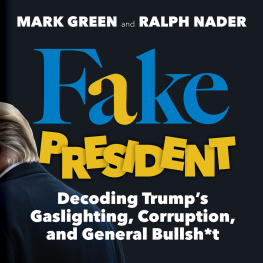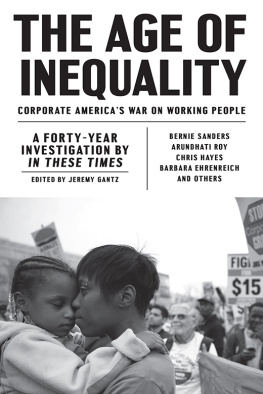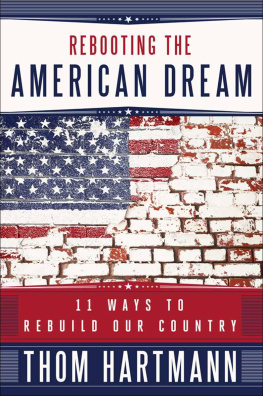Getting Steamed to Overcome Corporatism:
Build It Together to Win
Only the Super-Rich Can Save Us!
The Seventeen Traditions
Civic Arousal: Addressed to the Citizens of America
The Good Fight: Declare Your Independence and
Close the Democracy Gap
In Pursuit of Justice: Collected Writings 20002003
Crashing the Party: Taking on
the Corporate Government in an Age of Surrender
No Contest: Corporate Lawyers
and the Perversion of Justice in America
(With Wesley J. Smith)
Taming the Giant Corporation
(with Mark Green and Joel Seligman)
Unsafe at Any Speed:
The Designed-In Dangers of the American Automobile
Ralph Nader
The Seventeen
Solutions
BOLD IDEAS FOR OUR AMERICAN FUTURE
THE SEVENTEEN SOLUTIONS . Copyright 2012 by Ralph Nader. All rights reserved under International and Pan-American Copyright Conventions. By payment of the required fees, you have been granted the nonexclusive, nontransferable right to access and read the text of this ebook on-screen. No part of this text may be reproduced, transmitted, downloaded, decompiled, reverse-engineered, or stored in or introduced into any information storage and retrieval system, in any form or by any means, whether electronic or mechanical, now known or hereinafter invented, without the express written permission of HarperCollins ebooks.
FIRST EDITION
Library of Congress Cataloging-in-Publication Data is available upon request.
ISBN 978-0-06-208353-1
Epub Edition OCTOBER 2012 ISBN:9780062083548
12 13 14 15 16 OV/RRD 10 9 8 7 6 5 4 3 2 1
To Allan Nairn, who has bravely, humbly,
and methodically exposed human rights abuses
from East Timor to Guatemala.
First, I am grateful for the many citizens who have urged or worked on many of these solutions at one time or in one or more places in the United States. Without them, the linkages of concepts to practices would have not been possible.
I also thank my editor, Cal Morgan of HarperCollins, whose eye and pen few peers can match, and the incomparable John Richard for keeping this effort on track in all its details. The late-stage assistance of Katherine Raymond, Jeff Musto, Monica Giannone, and Matthew Marran kept the train moving toward its destination. Last, thanks to Marlene Thorpe and Lois Riley, who year after year kept me supplied with the contemporary material that informed this book.
Finally, I look forward to acknowledging those readers and doers who find any of these solutions sufficiently motivating to expand the number of public citizens pursuing their realization for the generations of today and tomorrow. Together we can overcome the institutional ravaging of social justice and the good life.
Ralph Nader
Contents
Since the mid-eighteenth century, American society has been known for its ability to solve problems through innovation. Yet in recent years it has become solution-averse. In an era when the American people are experiencing major deprivation, the powers that be are devoted to the status quoas long as their share of the pie keeps getting bigger, which it doesand they have the means and propaganda to keep it that way. More than ever, our nation needs change: stronger social safety nets; more effective electoral reforms; greater accountability for corporations; a shift of power away from the few toward the many; a return to communal self-reliance. Yet the publics expectations about what kind of country we can become are at a low tide.
Despite the stunning technological innovations that have marked our world for more than half a century, these conditions are only getting worse. Our country has far more problems than we deserve... and far more solutions than we apply. That gap is the democracy gap, and it underlies the paralyzing feeling of powerlessness shared by too many Americansa feeling easily mistaken for apathy.
This sense of powerlessness is surprising, given how deeply we are steeped in information. There is no expos gap in the United States. We are living in a golden age of investigative research: every year we are confronted by new documentary films, new TV reports, new online journalists and bloggers, new newspaper and magazine articles, and new books detailing abuses of power throughout our societyfrom Pentagon contractors cozying up to politicians for exorbitantly unneeded or fraudulent deals; to perpetrating illegal wars and tax shelters; to critically contaminating land, air, and water; to the looting or draining of trillions of dollars of other peoples money; to the impoverishment of political dialogue within a rigged political system; to the entrenchment of a corporate state of privileges, immunities, and bailouts; to the exacerbation of deepening poverty and casualties brought about by our corporate systemAmerican-style.
Even the mainstream corporate media offer their share of exposs: Bloomberg BusinessWeek , Fortune , 60 Minutes , ABCs Its Your Money , the Wall Street Journal all routinely publish probing journalistic investigations that far outstrip our undeveloped democracys ability, or willingness, to correct the injustices they expose. With few exceptions, the mainstream media pays far less attention to the civic actions that strive to do something with that information. Which is why we cannot claim to enjoy a truly democratic society until we also have a truly democratic, noncommercial media that is owned and controlled by the audience it serves.
Progress is supposed to be Americas trademark. And yet the reality is that, since 1972the peak year of real wages in our country80 percent of U.S. households have been sliding downward in standard of living. In the past three years, despite working longer hours, that slide has accelerated. Unemployment and underemployment as of this writing were at 8.2 percent and 15.7 percent (www.bls.gov/cps/), respectively. That is a blot on the face of the worlds largest and richest economy. Fifty million people should not have to fear illness without health insurance. Every year forty-five thousand Americans die because they cannot afford insurance for diagnosis and treatment. One of every three workers earns Walmart-level wagesfrom $7.25 to $10.50 gross per hour. Even two such workers, many without health insurance, cant support a household of four on that income.
By any measure, more Americans are poorer today than in 1972. What do we mean by poor? Look at the Department of Labors ridiculous definition of poverty: a family of four is not considered poor if it earns $23,050 a year before deductions. Economists have figured that to afford the bare necessities of life for four people would require an annual income of just over $40,000. By that yardstick, half of American households are poor. And statistics cannot begin to capture the sufferings, the impoverishment, the fear and insecurity of tens of millions of our fellow citizens who pick up after us, harvest and serve our food, care for our children, care for our elderly, and, disproportionately, fight our wars.



